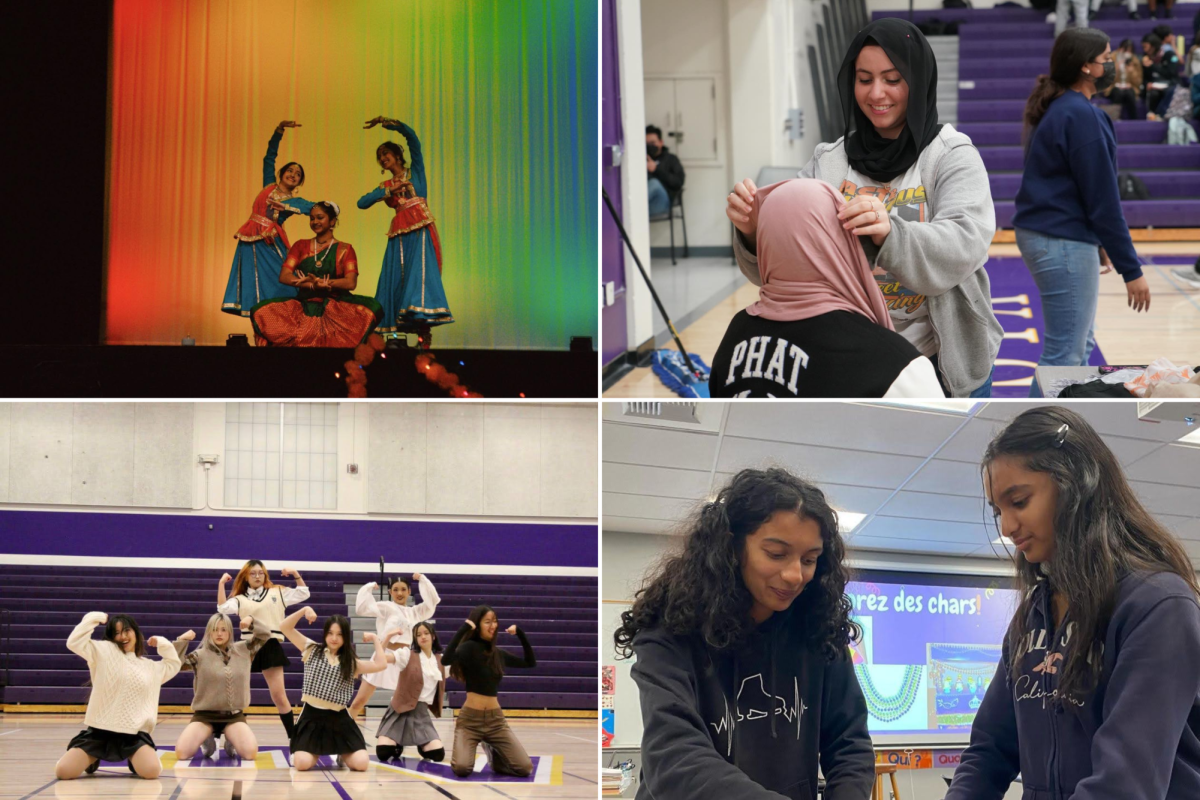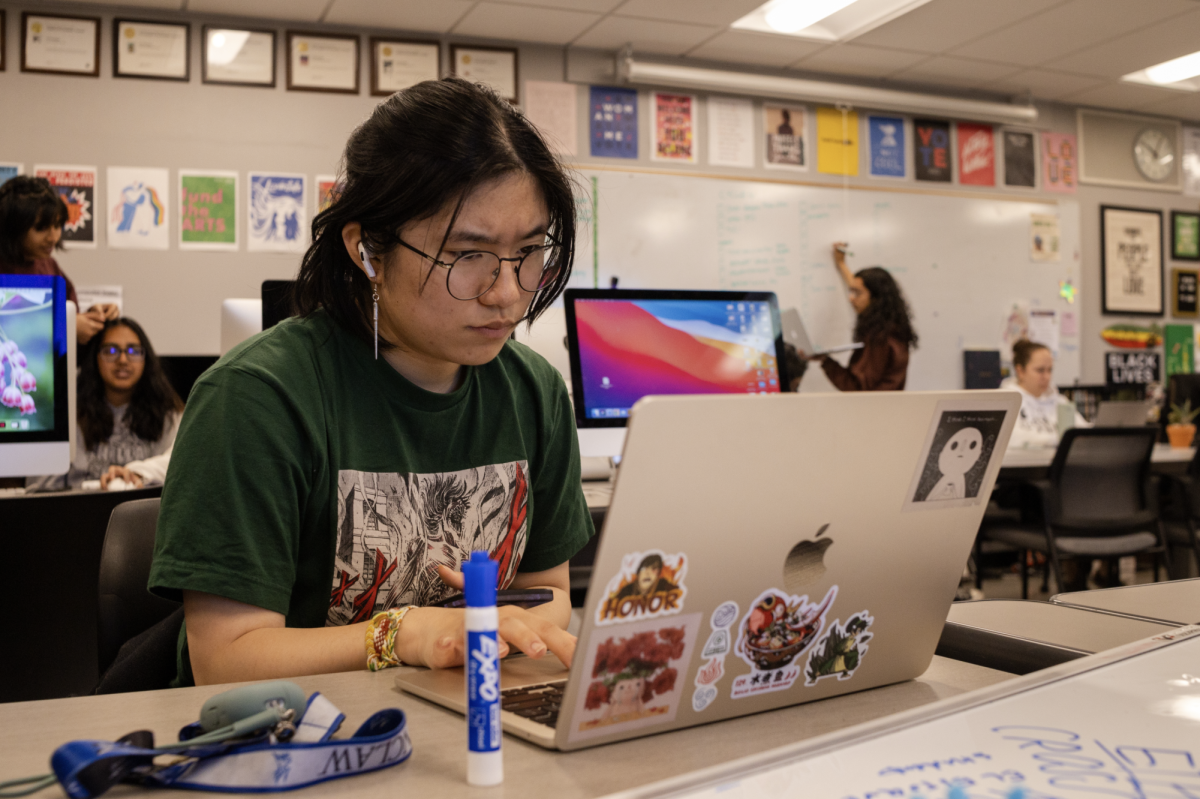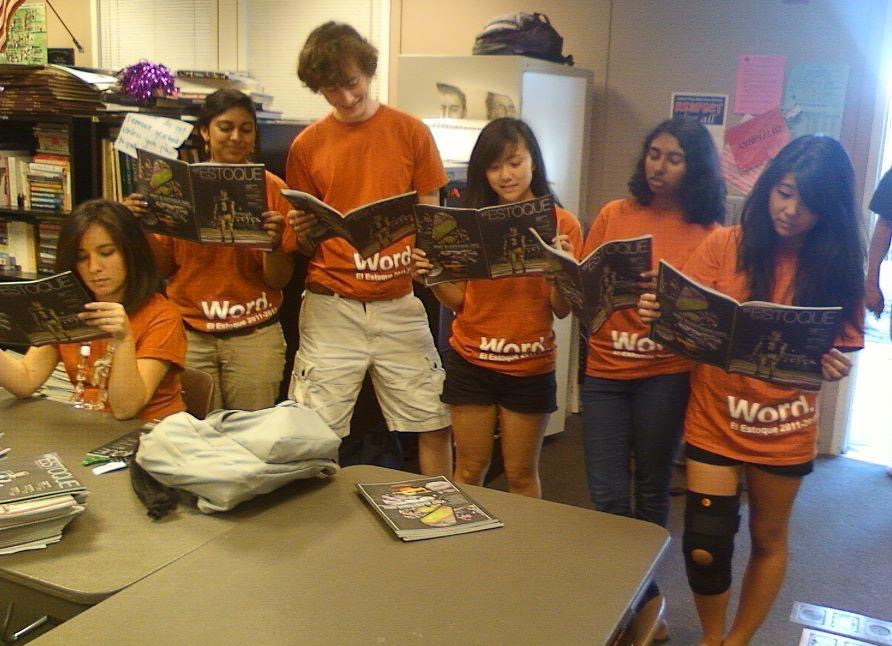LGBT students discuss social isolation and the need for understanding.
It was the same dream every night.Her nails sank into the grooves of her cheeks and raked down toward her chin, where her skin peeled away like a layer of wet clothing. There was never any pain. At least not until she would feel the dull ache of her jawbone throbbing under her skin, her teeth jutting from her mouth, her breath still buoyed in her chest, so full of air she thought she might burst.
“Then … it gets to the part where I wake up,” she said. She laughs and shakes her head. “And you know what? It’s super cliche, but sometimes real life is much worse than any dream.”
Jane Doe, who agreed to speak to El Estoque under the condition that she remain anonymous, remembers the days when she was small enough to wear pigtails and walk headfirst into tabletops. Those were the same days when she went to bed every night, only to jolt out of sleep a little past midnight, her palms slick and cheeks still tingling. But when she ran to the floor-length mirror in her brother’s room and squinted at herself under the glow of a Spongebob night-light, she could never see any difference. Her skin was still attached to her face. There was no blood. There was no change. And she hated it.
“In a way, those dreams weren’t even terrible,” Doe said. “Because even though it was the most horrible feeling, I was happy to know that at least I was finally tearing away … someone that I hated.”
What she wanted, however, wasn’t quite as readily available as the dozens of floral dresses and strappy sandals piled on the floor of her closet, which she affectionately refers to as her “wearable dumpster.”
“It’s ironic that I have all of this girly stuff,” she said, running her hands across a skirt printed with blue irises. “I’ve never really wanted this girly body.”
“I’ve never really wanted this girly body.”
Doe didn’t think much of her dreams until middle school, where the idea of changing for P.E. in a dank, sweaty room with a hundred other girls repulsed her so much she was sent to the school counselor by a P.E. teacher.
“They were like, ‘What’s wrong with her? Is it because she’s Muslim?’ And I wanted to laugh,” she said.
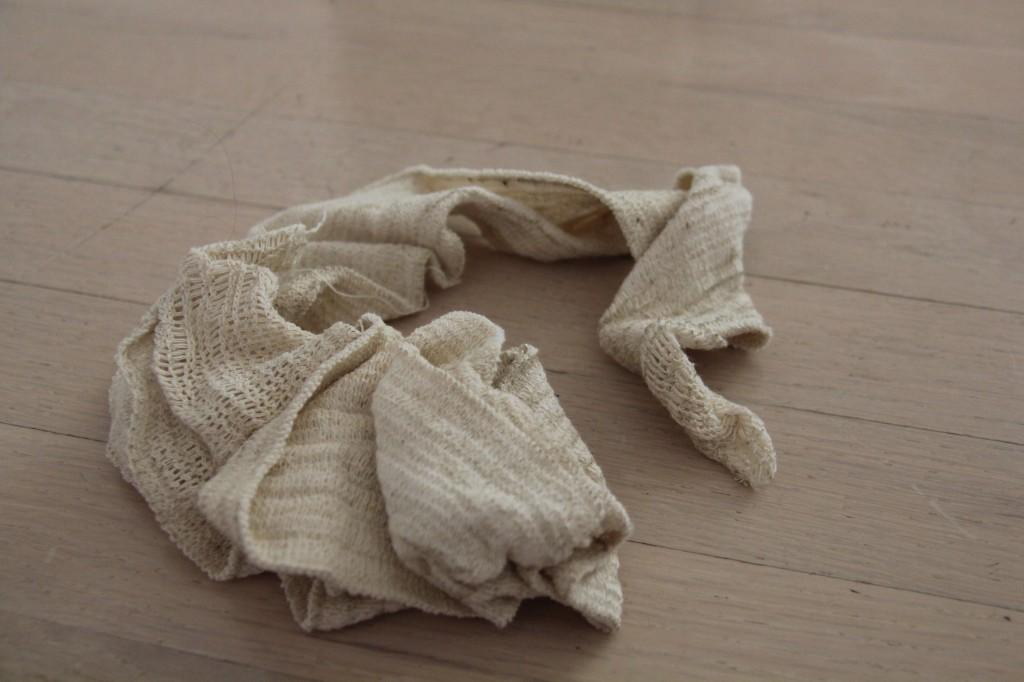
She remembers what she was wearing that day: cargo pants and an oversized black t-shirt that her mother wanted her to return because it was too “masculine.” She had heard those words too many time before. Her voice was “too masculine,” her hunched-over gait “too masculine,” her half-shaved hair “too masculine.”
Doe’s parents, after consulting with her school counselor , insisted that she learn to “grow up” and change by her assigned locker, or else they would stop paying for her art lessons. Mostly, they were confused: it wasn’t as if she were changing in front of boys. Their daughter had never been disobedient before. They figured it must have a typical teenager mood swing.
“There are two signs on each door, one girl and one boy, and really there should be more, or none.”
“The problem was that I didn’t know how to explain myself. I can now: There are two signs on each door, one girl and one boy, and really there should be more, or none,” Doe said.
Not only did she want privacy, but her protest was supposed to be an indirect cry directed toward her parents. She wanted them to understand that she didn’t feel like the white plastic figure stamped to a blue door. She didn’t feel like either of them.
Whenever she stepped by a mirror, she forced herself to avoid glancing at herself. She could never figure out why. When she wore the dresses her parents purchases for her piano recitals, she felt more than just discomfort. She felt as if she were wearing another person’s skin, while her own body was nowhere to be found.
!["I always tried to play gender-neutral sports. I hated [that] softball was for girls and baseball for boys, especially when I like both," Doe said.](https://www.elestoque.org/wp-content/uploads/2014/06/IMG_9780-1024x682.jpg)
“I began to overcompensate,” Doe said. She donned only loose-fitting t-shirts and pants, but it was a constant annoyance to have to adjust her clothing while walking.
“I just wanted to wear a potato sack. I wanted to disappear,” she said.
“I wanted to disappear.”
Her desire to fade away, to shed her outer self like a skin and to satisfy her desire for neutrality, is a type of gender dysphoria. Originally diagnosed in the 1950s as a mental disorder, gender dysphoria is the sensation of one’s sex or gender expression being entirely misaligned with one’s mind. Though people often generalize all gender dysphoria as transgenderism, as the switch from boy to girl or girl to boy is the most straightforward, gender dysphoria doesn’t always have a clear solution. It isn’t just about corrective surgery.
Doe would know. She has owned more identities than pairs of shoes.
“Am I lesbian? Straight? Queer? Transgendered? I don’t know. There’s not a word that seems to satisfy,” Doe said, sinking back onto her bed. The only thing she does know is that she cannot be the girl her mother once dressed up as Dorothy from the Wizard of Oz, complete with hair bows and ringlets.
“I don’t know when I can ever be honest. It’s not like I’m saying, ‘Ha! I’m gay,’” Doe said. “There’s never a good time to say, “Listen, I’m not what the doctor said I was.”
The summer before ninth grade, Doe began to emulate a steampunk character from an old sketchbook about 19th century fashion: her friend had helped her pierced her nose with a sewing needle, she’d turned thumbtacks into pinky rings, and her hair was now three shades of red and black. She’s even cut her hair and finally stopped wearing the eyeliner her friends had told her would “stop making her look ugly.” She wanted to look like Frida Kahlo, sans-unibrow, and now she would figure out a way to bind her breasts. Without her parents knowing, of course.
She wanted to look like Frida Kahlo, sans-unibrow, and now she would figure out a way to bind her breasts.
“My mom noticed almost immediately,” Doe said. “When I tried to tell my uncle about how worried I was about [my mother] and what she thought of me, and about my life in general, my parents came up to me and told me not to mention anything about my ‘feelings’ because I would embarrass them.”
Although Doe knows that her parents love her, she also knows that it will be a while before they understand the speckled pattern of bruises underneath her arms, where the Ace bandage digs into her skin. It will take them a while before they understand why she hesitates before swinging opening the door of the girls’ bathroom. It will take them a while before they learn to skip circling F or M on a medical form. But she is certain of imminent change, certain the way she is sure of an afterlife: through hope.
“It can take years for people to understand that gender is not binary,” child psychologist Julia Shu said. “It’s more of a social construct. As usual, it doesn’t reflect the whole population.” Shu, who has been a counselor for parents and their non-binary children, grew up never once questioning the two-gender system.
“It’s minority stress,” Shu said. “People who don’t quite fit in are so overwhelmed, and the first reaction is to hide.”
Hiding is nothing new for Doe.
Hiding is nothing new for Doe.
Sometimes, she goes onto Google calendar and ticks off the days until she will leave for college, where her life will begin all over again. And when it does, she’ll come out for the first and last time. She often imagine little movie scenes in her head whenever she’s in math class, imagining what her two best friends would say if she asked them to stop calling her “she.” Would they understand? Would it be worth the risk?
“I’m not ready yet. You always think you are, but then you aren’t,” Doe said. “I still visit my middle school and talk to my counselor once in a while, but for now I just want to be myself.”
Doe steps out of her room and teaches me how to clean out her cat’s litterbox, all the while humming to herself. When she stands up and shakes the soiled newspaper above her head, it’s a moment of triumph.
“Every day, I look around and I’m glad I seem a little strange to people. I’m also glad that I don’t have to be labeled in any way,” Doe drops the litter into the blue trash can beside the toilet. Before she leaves, she pivots around to take one aimed look at the mirror. She looks. She turns away.
“You know, I think I look pretty damn good.”
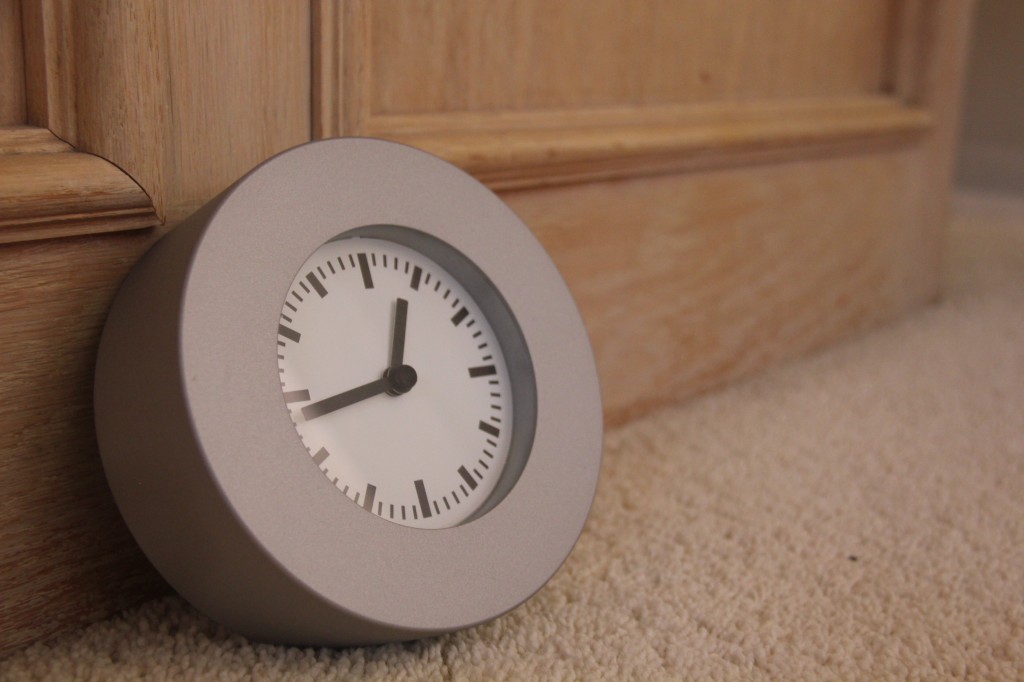
He had always been a terrible liar.
John Smith, who agreed to speak to El Estoque under the condition that he remain anonymous, recalls the afternoon following his twelfth birthday. He remembers stealing his brother’s fresh-out-of-the box neon orange Razor scooter, scurrying out of the garage with the chrome handlebars so shiny he was distracted by his reflection. It was the kind of day that was “perfect” for scootering: sunny, clear, the road slightly damp so that everything sped up.
He snapped off the back brake within a few minutes. He remembers skidding over a speed bump and then landing near a tree by the sidewalk, the scooter spiraling across asphalt about fifty feet away. Without bothering to brush the gravel from his bleeding knees, he ran home with the scooter dragging behind him and shoved it back into its cardboard box. When his brother discovered that the scooter no longer possessed a brake, he lied six times in a row. And he lied badly. He even blamed the neighbor’s daughter at some point. When his parents asked, he insisted that his scraped knees were the dangerous consequences of walking upstairs too fast. He couldn’t admit to his brother that he’d made a mistake, even when he sent up a silent promise to God.
That was also, incidentally, around the same time he realized he was gay. Which meant that he was lying about much more than a cracked fender. He was lying for the sake of what he believed was survival.
He was lying for the sake of what he believed was survival.
“I am a very slow speaker,” Smith said. “Very, very slow. It’s not really a speech impediment. It’s just that I’ve learned to be very, very careful about what I say and what I don’t say.” He speeds the ends of his sentences, as if perpetually fearing what the reaction will be. Fear has molded him in more ways than one.
“It’s different feeling fearing something that you are. Because there’s no way to escape yourself, not in a … permanent way,” Smith said. “But you can’t think about the fear too much, either.”
Nonetheless, Smith remembers the fear. He remembers the way his chest begins to ache whenever he lies, or how slick his palms become. He remembers being afraid of what seemed like everything, particularly when it came to “that gay thing.”
Sitting cross-legged on a sofa, Smith hardly appears meek: he is straight-backed and casual, assigning each household object a colorful history. He points to a polished jade clock that he once threw over the neighbor’s fence after somebody called him a fag. The next day, the undamaged clock was sitting on the same marble countertop by the kitchen, positioned at what seemed like the exact same angle.
“There’s no way to escape yourself.”
“I was so freaked out,” Smith said. “Seriously, I thought I’d hallucinated throwing it in the first place. I thought, ‘Crap, I’m going crazy, too.’”
As he moves on from the miracle of the clock to a seat cushion that he swears has been peed on by multiple nephews, Smith admits to having a flair for the dramatic, especially when it comes to telling stories about objects. He remembers trying to explain to his parents that his fishbowl had turned into a miniature revolving globe in the middle of the night, spinning on the ceiling like a disco ball. When his parents refused to believe him, he began to cry so loudly that the neighbors pounded on the door.
“That’s what happens when you’re a kid who’s become very used to lying,” he said. “You start to believe it. The lie is everything.”
The first and greatest lie that he told his parents was that he believed in God. He wanted, more than anything, to appear to be the most obedient disciple in all of Cupertino history, especially if it meant denying homosexuality.
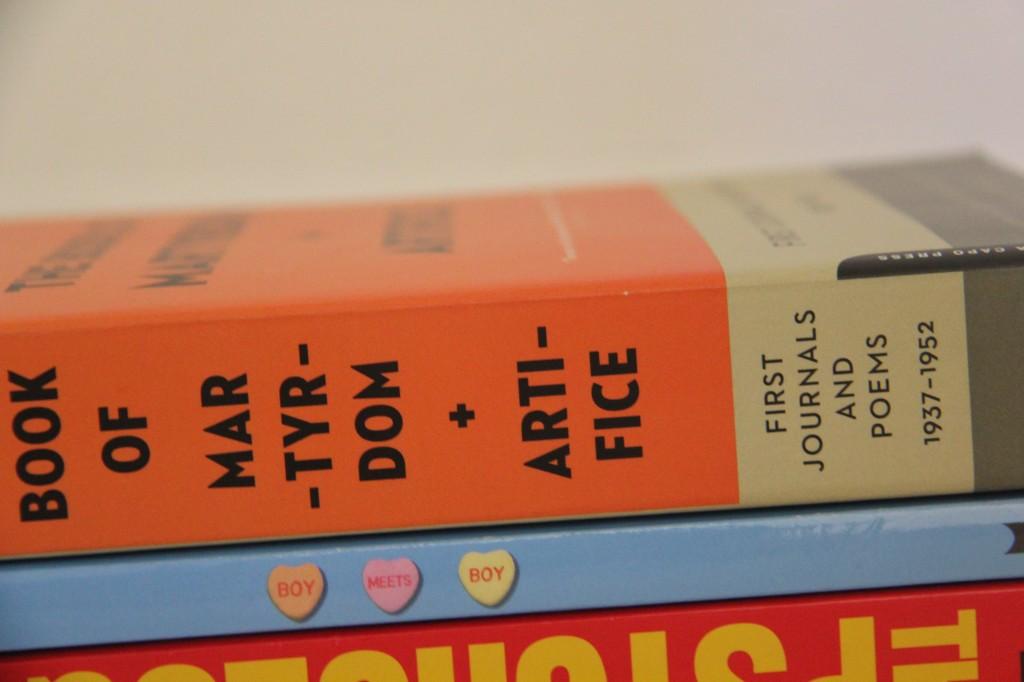
“I know that religion doesn’t necessarily counter homosexuality,” Smith said. “But people like my parents interpret things in a very old-fashioned way. I thought that if I acted like that, people would never suspect me. They wouldn’t ever attack me.”
He recalls one drama camp his parents forced him to attend, which happened to also double as a bible study group. He spent six hours a day with other Korean Catholics, pretending to have his head bowed when all he really wanted to do was run away and covertly explore the LGBT section of Barnes and Noble.
“I thought that if I acted like that, people would never suspect me. They wouldn’t ever attack me.”
“I think I was only sure of my being gay that summer, which is why I tried acting like a messiah or something,” Smith said. “As a way of compensating.”
Smith remembered holding his green leather bible in front of his face, using its yellowing pages as a sort of mask. He found himself hiding among the same people he was taught to love unconditionally. He found himself lying every single time he bowed his head over the dinner table with his parents, every time he sat on a greasy pew, every single time he recited the Pledge of Allegiance in elementary school.
“The more I waved my Bible around senselessly, the more I completely [lost] the person I was,” he said.
He quoted anti-gay texts. He watched Youtube videos of the Westboro Baptist Church and tried to repeat their slogans. He wore a tie-dye shirt that read “I am with God” in comic sans font. But after entering high school, his attempt to be the anti-gay crusader didn’t seem to boost his status as an “openly straight” male.
“MVHS has this weird culture where people accept gay people, and want to be liberal and all that, but then turn around and call each other gay,” Smith said. “Classrooms are ‘safe spaces’ but nobody is safe from really homophobic slurs.”
It seemed that no boy could graduate from MVHS without being insulted as “gay,” and so he discarded his entire plot to become the single most homophobic Catholic in all of MVHS.
“If I’m going to be insulted anyway,” Smith said, “I might [as well] be insulted for being the actual person I am.”
And so he plans to be out at some point in his high school life, even if it means being that “gay one.” Smith doesn’t like to call his state of limbo a “closet,” and he certainly doesn’t enjoy locking himself into what seems like an infinitely small room.
“The more I waved my Bible around senselessly, the more I completely [lost] the person I was.”
He considers smashing the hinges of the closet door he was born behind. He considers dangling a rainbow flag from his second-story window. And he considers, on a whim, dressing up as Madonna and serenading a garbage can, just because he can. There is a lot he wants to do. Especially if it means proving that though he’s lied before, he no longer cares enough about other people’s opinions to continue lying.
“Sometimes, you have to take some chances,” said student advocate Richard Prinz. “[It’s about] picking the right time and the right person.”
And for Smith, the right time has not yet arrived. Lying has become a lifelong habit.
Lying has become a lifelong habit.
“It’s a way of being,” Smith said. And though being truthful may require a year-long quest to abandon the book he never believed in and find his own brand of faith, he is certain about one thing. While there may never be a right time, the right person is no farther than the next room over, where Pharrell’s “Happy” is pouring out from a desk stereo, through the crack of the door and out into the hallway. His brother will be the first to know.
Smith smiles. “You know, I hate that phrase ‘Honesty is the best policy.’ That’s assuming people like what they hear.”
He pauses, folds his hands together. “I hope they do.”


















